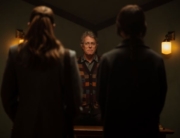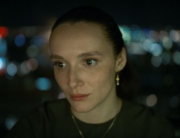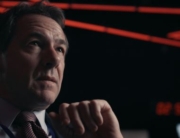
The past decade has seen its fair share of apocalyptic films, and it is unclear how many of them will be remembered. When Jeff Nichols’s Take Shelter, about the fear of impending disasters, came out 10 years ago, it felt perfectly attuned to its times. These days, when we are knee-deep in disasters in both reality and in cinema, it has become clear that an apocalyptic premise sells and that, consequently, many of these movies will be subpar. With so much competition, a dystopian film must work extra hard so that its efforts rise above the dreck.
Michael Franco’s New Order starts on sure enough footing. After a disorienting scene in which ailing people are hurriedly taken out of a hospital (presumably in response to some disaster), the film quickly cuts to a couple, Marianne (Naian González Norvind) and Alan (Darío Yazbek Bernal), kissing at their swanky wedding. Her family is hosting, their guests are all of society’s upper echelon, and the overall tone is one of tenuous joy.
But not all guests have arrived, including the judge who is to legalize the marriage, for protestors are filling the streets, throwing green paint at the cars of the rich. Anyone who worries is quickly told to forget about it and to enjoy the celebration, though Marianne’s mother obsessively runs back and forth to check on a high-security safe. Here, Franco displays great skill at handling crowds and creating atmosphere. The soundscape shifts as the attendees move in and out of rooms, all of whom seem genuinely preoccupied with their own motives, while interactions are continually interrupted as more guests arrive.
The situation turns grimmer when Rolando (Eligio Meléndez), an elderly man who used to work for the family, shows up asking for money. His wife, Elisa (Regina Flores), is one of several we have seen taken from the hospital in the beginning. She was up for heart surgery, and he requires a whopping $200,000 to get her back to a hospital for the operation. He’s only coming to them because he has nowhere else to go. His presence adds an interesting layer of tension, as family members respond to him in different ways—no one neglects to give him money, but no one gives him quite enough. Marianne is the most compassionate, to the point where she actually gets in a car with Cristian (Fernando Cuautle), who works for her, to go and bring Elisa to the hospital.
In short, this film begins with some promise. The acting is strong, and the assorted characters and their relationships intrigue us. Why, for instance, does Marianne care so much about Elisa? Is it just blind compassion, or do they have a deeper relationship? What makes her so different from the rest of her family? What we see is, potentially, held together by rich, ambiguous circumstances and history, and this viewer at least was anxious to learn more.
But, no such luck. Protestors scale the walls of the home, Marianne is captured while she is out with Cristian, and from then on, the film is best described as a parade of trauma and violence. Months go by, blood splatters, and we witness Marianne suffer indignity after indignity and people ruthlessly killed and tortured. The protestors are one-dimensional and barely explored—we know next to nothing about their motives save that they are ruthless and angry at the rich. Whatever interest Franco has in Marianne and others and in their situation promptly disappears as his screenplay races from inhuman act to inhuman act as though going down a bullet-point list.
Perhaps it was the director’s intention to dramatize how any uprising can become just as immoral as the society it rebels against, and that violence and inhumanity breed more violence and inhumanity. If so, fair enough. But without creating genuine interest in its characters and circumstances, a film like this becomes as meaningless as the violence it depicts. As such, New Order will join the ranks of the more forgettable nightmares of times to come, being little more than a barely realized vision itself.






Leave A Comment